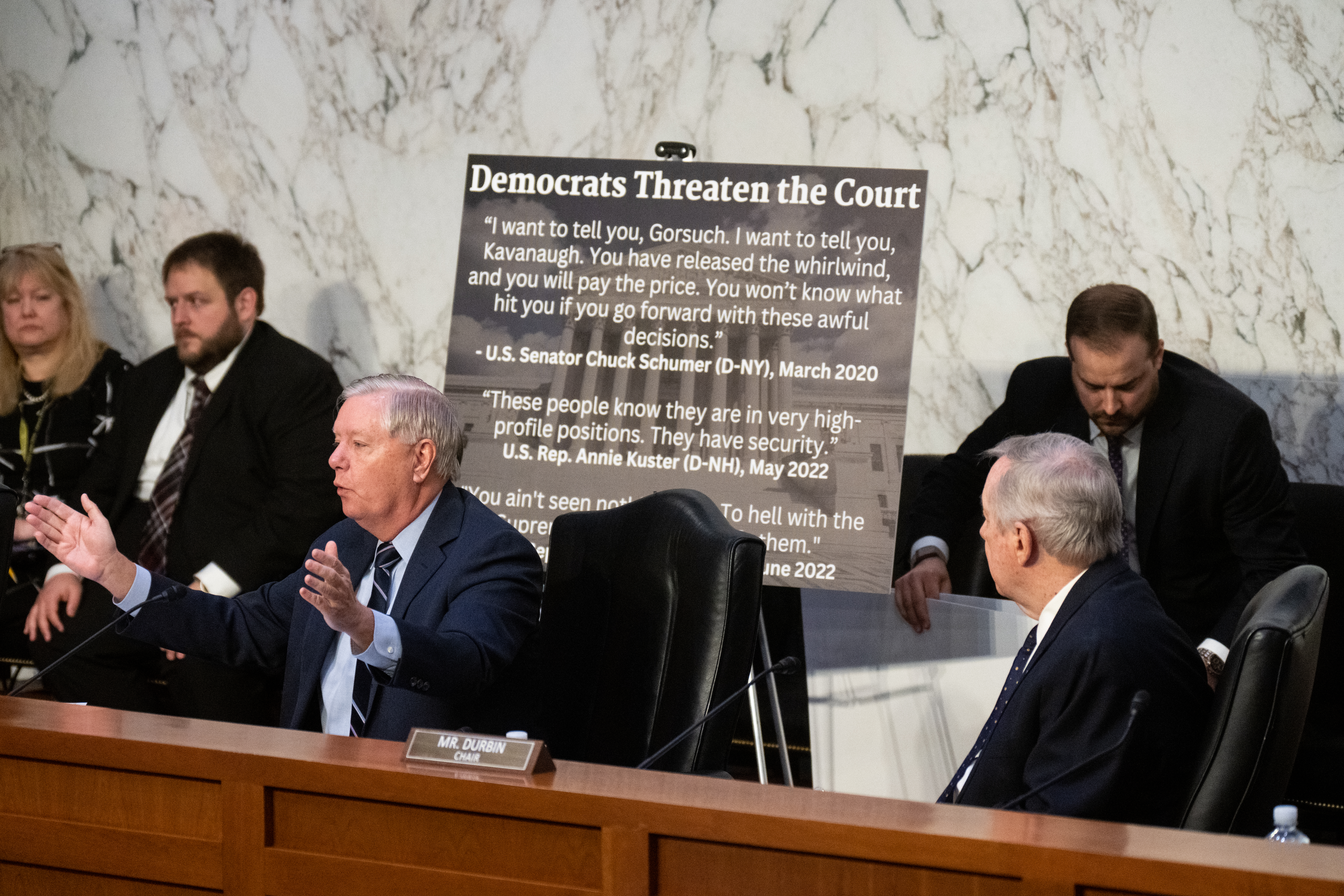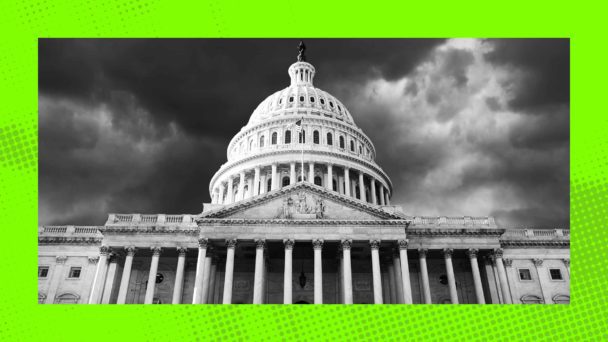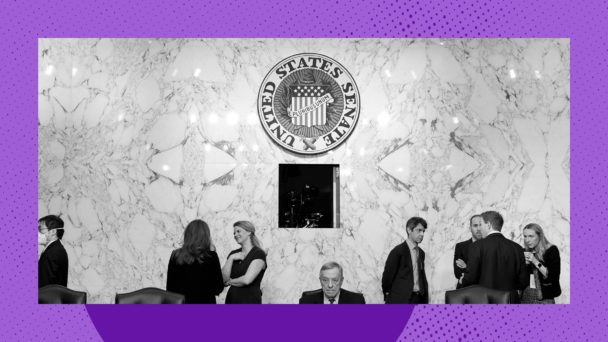On Tuesday, Democrats on the Senate Judiciary Committee convened a hearing titled “Supreme Court Ethics Reform,” on the heels of a concerning number of media reports about just how much the justices are enjoying the largesse of rich people who can afford to provide it. The panel’s witnesses consisted of a law professor, a retired judge-turned-law professor, a BigLaw lawyer, a retired judge-turned-BigLaw lawyer, and an ethics expert at a voting rights nonprofit. If the absence of Supreme Court justices at a Senate hearing about Supreme Court ethics sounds to you like a gigantic waste of time, congratulations, you have a better grasp of this strategy’s fatal flaw better than the one body with the power to do anything about it.
Even at an institution that pioneered the art of inane political theater, this hearing was a special brand of useless. Democrats spent their allotted time making the case that the Court’s decades-long refusal to subject itself to a binding ethics code makes it unworthy of the public trust. Republicans, meanwhile, spent their allotted time caterwauling about how ethics reform is a Trojan horse for a far-left plot to “delegitimize” the Court, which, again, consists largely of dudes whose hands are permanently ensconced in right-wing billionaire cookie jars. At one point, Texas’s John Cornyn played a clip of Clarence Thomas responding to sexual harassment allegations during his 1991 confirmation hearings, in an apparent effort to remind Americans that “concealing lavish superyacht vacations paid for by Nazi-curious billionaires” is not the only scandal for which Thomas has never been held accountable.
After announcing the hearing last month, the committee chair, Illinois Democrat Dick Durbin, wrote a letter to Chief Justice John Roberts “inviting” him to testify. Yet after Roberts “respectfully declined” in light of “separation of powers concerns,” Durbin waved the white flag, telling reporters he would not try to subpoena Roberts or anyone else. When asked why he didn’t “invite” Thomas to answer for his ethical lapses himself, Durbin explained that he simply assumed Thomas would “ignore” it. This is roughly the equivalent of cops shrugging and allowing the bank robbers to walk out the front door with bags of cash over their shoulders because they did not obey when ordered to freeze.

Lindsey Graham pretends to be upset about something at Tuesdays’ hearing (Bill Clark/CQ-Roll Call, Inc via Getty Images)
During the hearing, Durbin said all the things that Very Concerned Lawmakers are supposed to say, correctly pointing out that John Roberts delivering a written middle finger to the very concept of checks and balances would be its own separate scandal for any other politician at any other level of government. “The chief justice’s letter and statement of principles are a defense of the status quo,” Durbin said. “But they are oblivious to the obvious.”
What Durbin doesn’t seem to understand, however, is that law school lectures and earnest appeals to bipartisanship are not going to work here. The Republican Supreme Court justices availing themselves of the perks of the job have no incentive to adjust their behavior; the Republican senators who approve of what Republican Supreme Court justices are doing have no incentive to make them do so. By extending to Roberts and Thomas different versions of the same kid-gloves treatment, on the subject of Clarence Thomas’s ethical misconduct, Democrats have essentially deferred to Clarence Thomas’s judgment.
For Senate Democrats, this is as much a missed political opportunity as it is an abdication of their responsibility. The Court’s approval numbers are already at historic lows, driven by the conservative supermajority’s bumper crop of reactionary opinions that have pushed the law in directions that normal people emphatically do not want it to go. Thomas’s penchant for palling around with Republican megadonors allows Democrats to show voters that the justices writing these reactionary opinions are not on the level, and the Senate Republicans engaging in Cornyn-esque histrionics are orchestrating a very clumsy cover-up. This is an argument Democrats can win, and for some godforsaken reason they are barely making it.

(Photo by MANDEL NGAN/AFP via Getty Images)
Durbin has blamed this mess at least in part on the medical absence of California Senator Dianne Feinstein, which has temporarily deprived Democrats of their working majority on the Judiciary Committee. Without her vote, Democrats could not subpoena Thomas—and, even more importantly, cannot advance President Joe Biden’s judicial nominees—without at least some Republican support. “It takes a majority. I don’t have a majority,” he said in April. “There’s been no discussions for subpoenas for anyone at this point.”
I might find this more persuasive if Durbin were, say, calling on Feinstein to resign in light of Feinstein’s inability to fulfill her duties. I also might find it more persuasive if he were hammering Republicans for enabling the corruption that Americans are reading about in the newspaper every day. Instead, he has asked Senate Republicans—the same Senate Republicans whose capture of the Supreme Court is directly attributable to their willingness to play partisan hardball—to show “kindness” to Feinstein, by allowing Democrats to temporarily replace her during this “delicate part of her life.” I do not mean to shock you, but so far, this plea for cooperation has no takers. “We’re not going to help the Democrats with that,” Iowa Republican Joni Ernst said.
This is not the only aspect of the Judiciary Committee’s work where Durbin has adopted a position of preemptive surrender. The blue slip is an archaic Senate courtesy that functionally allows senators a veto over district court nominees in their states; if, say, Ted Cruz doesn’t like a nominee to an empty seat in Texas, the nomination doesn’t go forward. Republicans have spent two years gleefully abusing this loophole to snarl the confirmation process in states without two Democratic senators: As Jennifer Bendery notes at HuffPo, Republicans have returned 13 blue slips since Biden took office. Under Trump, Democrats returned 84 of them.
After Wisconsin Republican Ron Johnson refused to return his blue slip for William Pocan last year, Durbin said that he “hoped” Johnson would reconsider (Johnson did not, in fact, reconsider) (Clip via YouTube)
Democrats, if they were so inclined, could unilaterally stuff the blue slip tradition in the garbage. But Durbin has insisted that he’s “not at that point,” and expressed hope that he can find “common ground” with Republicans going forward. In April, Mississippi’s Cindy Hyde-Smith refused to return her blue slip for federal district court nominee Scott Colom, citing a campaign donation he once took from a Soros-affiliated PAC and a letter he signed condemning anti-trans legislation. Durbin responded to this Fox News bingo card of an excuse for scuttling a qualified Black nominee by stating that he was “very disappointed.” If Democrats have a strategy for dealing with GOP obstructionism other than uncorking as many synonyms for this sentiment as they can think of, they have yet to unveil it.
Over the last two-plus years, the Biden White House has done a ton to overhaul a federal bench dominated by former prosecutors, BigLaw partners, and/or Trump freaks. But the easy part of this work is over. Accomplishing anything more between now and January 2025—overhauling an out-of-control Supreme Court, subjecting its justices to meaningful ethics rules, confirming lower court judges in red and purple states, and so on—is going to require an appetite for the fight.
By backing down at these critical junctures, Democrats are making the same mistake they’ve been making about judicial politics for my entire adult life: treating Supreme Court justices and their Republican enablers not as political opponents they have to defeat, but as well-meaning colleagues whom they are on the verge of persuading, just as soon as they find the magic words that will do it.




